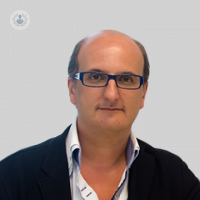The no scalpel vasectomy is considered the best technique currently
Written by:What is vasectomy without a scalpel?
Vasectomy without a scalpel is a way to perform the vasectomy operation, by using special forceps, which avoids cuts with a scalpel.. This way you can perform this operation more quickly and with much less discomfort for the patient.
The vasectomy without scalpel was invented by Dr.. Li Shunqiang in 1974 in China, at a time when only one child per family was authorized, with the aim of achieving a definitive contraceptive method with simpler instruments and allowing patients to return to their normal work on the same day of the intervention. This also managed to reduce the fear of men in relation to the operation, and since then more than 15 million Chinese have had a vasectomy with the technique without a scalpel.. This technique was introduced in the West by Marc Goldstein (USA) in 1984, and in our country by Dr Villadoms in 1994. Currently, vasectomy technique without scalpel is considered the best available.
What is the technique?
The conventional technique of vasectomy consists of making two cuts with scalpel in the skin (one in each testicle), to extract, cut and / or ligate each of the vas deferens, through which the sperm of the testicle leave.
It is a simple and effective intervention, but most of the complications (haemorrhage, bruising and infection) are caused by the scalpel incision.
The vasectomy technique without a scalpel does not require any cutting, and therefore no scalpel is used. Tongs specially designed to separate the skin and externalize the vas deferens are used in a much less traumatic way.
A more recent advance consists of the so-called vasectomy without a scalpel and without a needle, which avoids the annoying initial puncture to apply the local anesthetic. Through a device called MadaJet, spray anesthesia is applied to the skin and the deferent, making the vasectomy painless.

Do you have risks?
Any surgical intervention may be at risk. In the case of vasectomy, the most frequent are bleeding (hematoma), testicular pain or infection. What has been demonstrated is that these complication risks are much lower with the vasectomy technique without a scalpel compared to the conventional technique.
In fact, the WHO recommends the following in this regard:
"Compared to the traditional incision method, vasectomy without a scalpel resulted in less bleeding, bruising and pain during or after the procedure. The surgical procedure is shorter and men who undergo a vasectomy can resume sexual activity more quickly. The no-scalpel technique is currently used in more than 40 countries. "
Is it reversible?
Vasectomy is a permanent method of contraception, but it can be reversible most of the time through a microsurgery operation called vaso-vasostomy.. Anyway, this reversal is a much more expensive and delicate operation than vasectomy, and if it has been many years since vasectomy it is likely that you will not have enough sperm in the semen to achieve a natural pregnancy, which would It is necessary to use assisted reproduction techniques (in vitro fertilization).
That is why we do not recommend vasectomy if there are doubts about having more children.
Does vasectomy change sexuality?
Vasectomy does not affect the production of testicular hormones, only the production of sperm.
The desire and sexual potency, the sensations in the sexual act, the orgasm and the ejaculation do not change.
It also does not affect the voice, muscle mass or beard.
It is advisable to avoid intense physical activities for the first 48 hours. From there, sexual relations can be restarted as soon as no discomfort is noticed, although most of them usually wait for about a week.
Sexually transmitted diseases (STDs)
Vaginoplasty
Penis Enlargement (Phalloplasty)
Urology Treatments
Urologic Laparoscopy
Urologic Oncology
Pediatric Urology
Geriatric Urology
Kidney Transplantation


